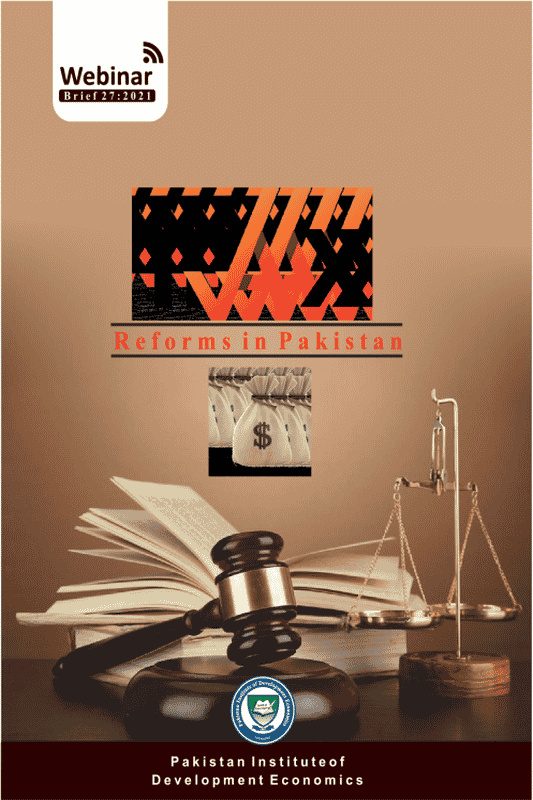
Pakistan Institute of Development Economics
- Home
Our Portals
MenuMenuMenuMenuMenuMenuMenu - ResearchMenuMenuMenuMenuMenuMenuMenu
- Discourse
- The PDR
- Our Researchers
- Academics
- Degree Verification
- Thesis Portal
- Our Portals
Tax Reforms In Pakistan
Publication Year : 2021
Author: Farah Naz
Explore More : Webinars Brief
Tax Reforms in Pakistan
Preamble
Dr. Nadeem Ul Haq opens the discussion and Mr. Ali Suleman introduces the two books to the audience, first one is “Tax Reforms in Pakistan Historical and Critical Review” and the second is “Towards broad, Flat, Low-rate and predictable taxes”. These books are authored by Ms. Huzaima Bukhari and Dr. Ikramul Haq, and published through the platform of PIDE and PRIME.
These books discuss the systemic and organizational flaws in tax system and recommend potential solutions to help where fundamental reforms are needed. Accordingly, taxpayers negotiate with numerous tax authorities, which increases their cost of doing business and lack of tax-related incentives is always overlooked in reform debate.
Key Messages
- There is a process of progress and improvement everywhere but in the case of Pakistan we are moving in reverse like from progress to deterioration. From last seven decades we are trying to bring in reforms that are never delivered in the true sense. Therefore, economic foundation is still fragile despite of introducing tax reforms.
- Taxes are by-products of economic growth but the past four decades have seen a complete reversal of this concept resulting in tax base erosion and acute distortions in the economy.
- Confiscatory taxation means growing demand for taxation without compensation. Confiscatory taxation and the non-existence of social contract between government and people are very serious matters because if the public doesn’t get anything in return then the desire and motivation to pay taxes also disappear.
- The exploitative and manipulative taxation system is adversely affecting the economy.
- Among the main challenges is to shift the paradigm of tax policy, we need to move towards optimal taxation which will encourage businesses to perform better which will ultimately promise more tax revenue collection for the government.
- Some solutions are being suggested for tax reforms; as the taxpayer is obliged to pay taxes, he also has certain rights which need to be properly legislated for the sake of security for the taxpayer. There is a need for new tax laws which should be simpler and easily understandable by everybody. There is a need of harmonized tax system by merging collection of taxes by the federal and provincial government under one authority like one window operation, and introduction of “national tax tribunal” which will be a specialized forum for the compensation of grievances of taxpayers and department as well.
- Problems with the tax system are obvious, but there is no room and capacity to discuss them to bring reforms. Every time externally different agendas are imposed on us by saying this is best for us and we are supposed to implement that.
- The tax to GDP ratio is low and on the other hand, the kind of tax expenditures we are incurring heavily include concessions, waivers, etc.
- In the military and even in democratic government there is no single voice mentioning tax course simplification to be made understandable to every citizen and there is no discussion about tax courts to simplify tax laws.
- We have a sufficient number of mobile users but no data about their tax status is available. Culture of lenders and donors is implemented on us whereas all relief is for the elite class like amnesty schemes etc.
- It is always advised to collect progressive taxation but most of it is wasted on debt servicing (over Rs. 2500 billion), defense expenditures (Rs. 1 trillion), pensions, etc. Out of the revenue generated 57% goes to provinces, but on the other side provinces are not involved in policymaking, they are excluded.
- Income tax is fragmented in agriculture income tax and non-agriculture income tax, it should be at one place, sales tax is also fragmented, differentiated for provinces and centers. All these things make it difficult for taxpayers, especially for those doing business across provinces.
- The proposal of flat taxation consists of 4 pillars, firstly transformation from high rates to low rates, secondly from different fragmented taxes to single flat taxation, thirdly from exemptions to broad-based, and fourthly from discretionary policies which are based on SRO’s to predictable policies.
- The proposal talks about a new tax code which is essentially 4 numbers, there is a proposal that income tax on salaries, non-salaries, and partnerships to be brought at single 10% across the board with no exemptions, secondly income tax for the cooperates is proposed at 20% from 29-39% as existed previously, thirdly 5% single-stage sales taxation across the board is proposed at last stage of consumer and deposited back to the state, lastly the custom duty proposed at 5 % across the board.
- Based upon the proposal the projections are that through these reforms the taxation system will convert to progressive from regressive, reliance on import taxation will be significantly reduced (current reliance is around 35-40% on import taxation which is one of the highest in the world), and the tax system will become progressive in terms of greater reliance on income tax bringing about 2.5 million new potential taxpayers.
© 2024 Pakistan Institute of Development Economics



